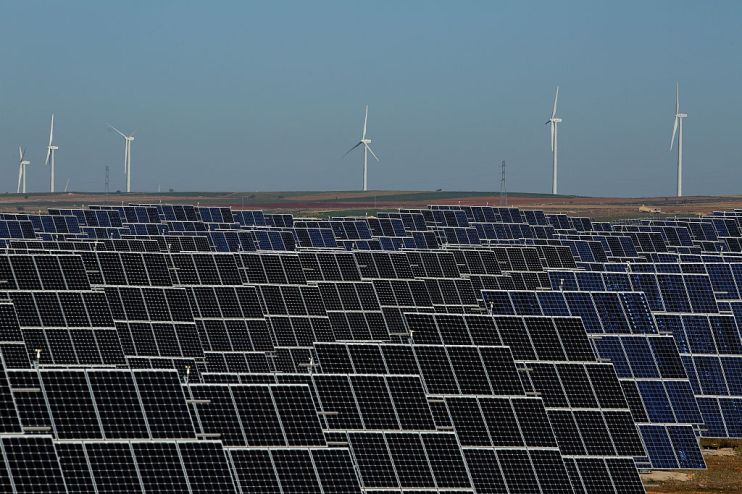Exclusive: Farming body backs green projects after Truss’ solar snub

The National Farmers Union has defended the development of renewable projects such as solar panels across the UK’s agricultural landscape, and considers new projects essential to the industry’s climate ambitions.
NFU Deputy President Tom Bradshaw told City A.M.: “Renewable energy production is a core part of the NFU’s net zero plan and solar projects often offer a good diversification option for farmers.
It warned the Government has to “strike a balance” between food security and meeting climate goals.
The industry group believes new renewable projects should be focused on lower quality land and that there also also needed to be a push for solar panels on roofs and farm buildings.
Bradshaw said: “It is important that large scale solar farm development is located on lower quality agricultural land, avoiding the most productive and versatile soils. Utilising roofs and farm buildings for solar should also be incentivised as it delivers a sustainable method of energy production while avoiding any land use conflict.”
This is not the first the NFU has stepped into to offer a dissenting view from the Government, which reportedly considering a plan to ban solar farms from most of England’s farmland.
It previously criticised Prime Minister Liz Truss’ dismissal of solar panels on farmland as “paraphernalia”, describing solar panels as a great “diversification” opportunity for farmers.
| Energy source | Generation | Target | Deadline |
| Solar power | 14GW | 70GW | 2035 |
| Offshore Wind | 11GW | 50GW | 2030 |
| Nuclear | 7GW | 24GW | 2050 |
| Hydrogen | 1GW | 10GW | 2030 |
Following her successful leadership race, new environment secretary, Ranil Jayawardena wants to significantly cut the number of eligible fields for new installations, according to The Guardian.
He believes new solar projects hamper his two-pronged push for growth and a boost in domestic food production.
The UK produces around 74 per cent of the food it consumes, although there is concern over how much certain ingredients are imported – with only 15 per cent of tomatoes and 23 per cent of cucumbers consumed domestically grown in this country.
Meanwhile, the Government is targeting ambitious growth levels of 2.5 per cent of GDP before the next election in 2024.
The Countryside Alliance also confirmed its support for renewable projects.
Sarah Lee, director of policy for the rural issues group, told City A.M. it was important farmers contributed to making sure the UK “has a mix of sustainable energy” to tackle climate change.
While she preferred developments to be on brownfield sites and rooftops, she believed solar panels were viable on farming fields below grade one quality.
She said: “The growth of solar projects is an important part of this energy mix but it should be targeted on brownfield sites, rooftops and new builds rather grade one agricultural land as food security is also an important issue facing this country”.
Government to cut viable farming land for solar
Jayawardena has asked officials to redefine “best and most versatile” land (BMV) – which is designated for farming – to include the middling-to-low category fields.
Planning guidance outlines that development on BMV land should be avoided, even if authorities may take other considerations into account.
Land is currently rated from one to five, and currently BMV includes grades one to 3a.
Jayawardena is reportedly pushing to expand this to fields in the 3b category.
As most solar farms are built on and planned for 3b land, this move would jeopardise most new developments of the renewable energy source.
Expanding BMV to grade 3b would exclude solar projects from about 41 per cent of the land area of England, and 58 per cent agricultural land.
The bulk of of grade four and five land is in upland areas that are widely considered unsuitable for solar developments.

The Government is targeting a vast ramp up in solar power as part of its energy security strategy, aiming to boost generation from 14GW to 70GW by 2035.
However, the strategy was outlined under former Prime Minister Boris Johnson, with his successor Liz Truss being publicly sceptical of solar power.
During the leadership race, she slammed solar panels on farmland a threat to food security.
Speaking at a hustings event in the summer, Truss said: “I’m somebody who wants to see farmers producing food, not filling in forms, not doing red tape, not filling fields with paraphernalia like solar farms. What we want is crops, and we want livestock.”
Since then, she has named and shamed a list of enemies at the Conservative Party conference, including green campaigners in the “anti-growth coalition” that she believed was obstructing growth.
The UK is currently scrambling to secure supplies this winter, to avoid blackouts, with the National Grid forecasting potential blackouts in January if its worse case scenarios come to fruition.
When approached for comment, a spokesperson for the Department for Environment, Food and Rural Affairs (DEFRA) said: “The environment, farming and economic growth go hand-in-hand, and as stated in the Growth Plan, we are committed to increasing our long-term energy security and strengthening the UK’s food security.”
“That’s why we will be looking at the frameworks for regulation, innovation and investment that impact farmers and land managers to make sure that our policies are best placed to boost food production, increase resilience, drive growth and protect the environment.”